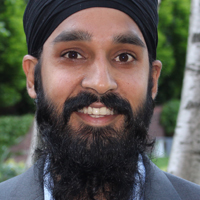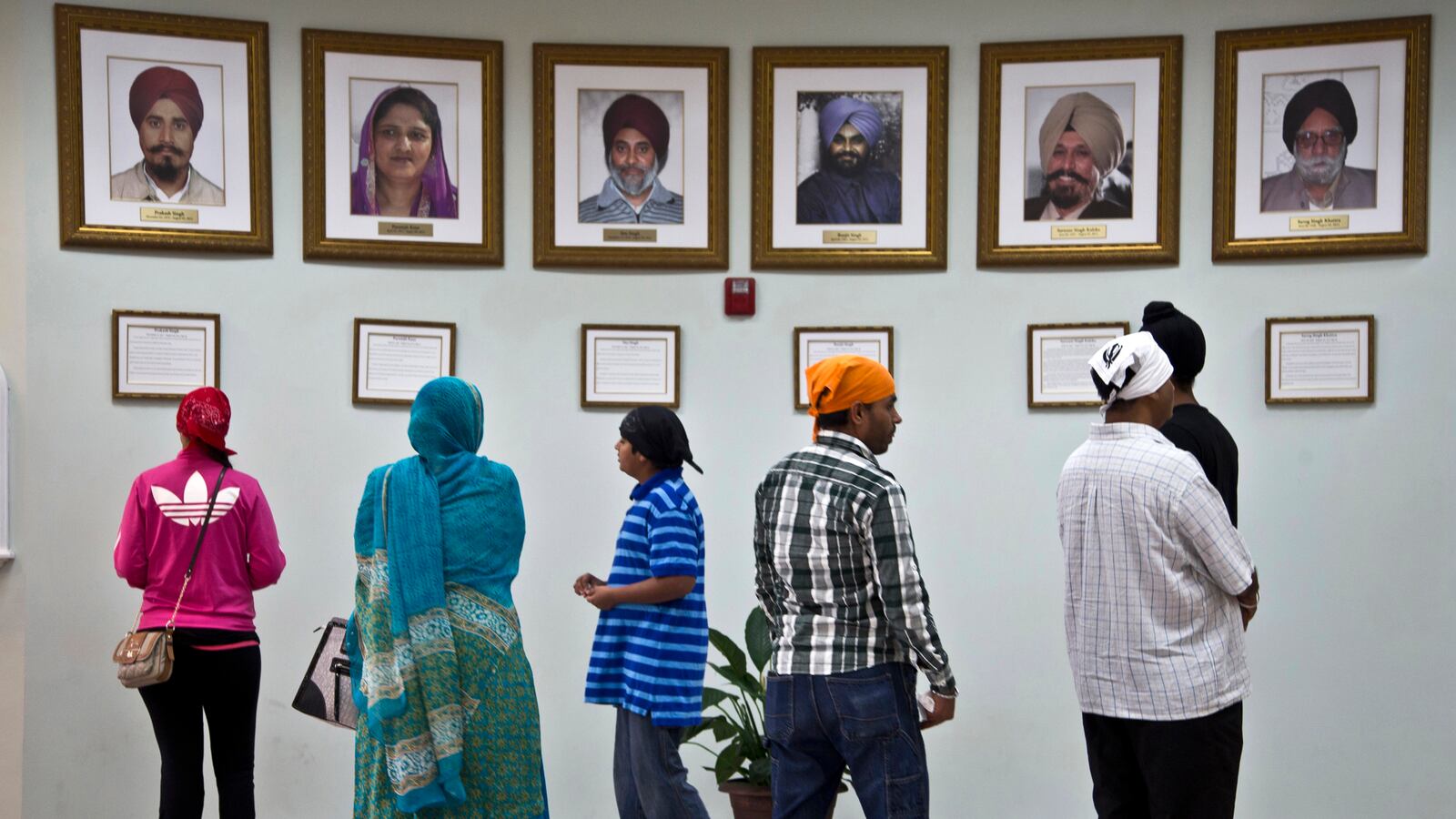On August 5, 2012, white supremacist Wade Michael Page wreaked havoc on the Sikh community of Oak Creek, Wisconsin, carrying out the largest hate crime at a place of worship in recent American history.

Many people responded by calling for Sikhs to abandon their unique religious identities so that they could better blend in with the rest of society. Harleen Kaur, a young woman raised in this southeast Wisconsin community, chose a different direction. Less than a month after Page opened fire on her home congregation, Harleen decided to openly declare her identity as a Sikh. She decided—for the first time in her life—to begin wearing a turban.
Now she stands out in crowds, even in groups of other Sikh women.
Tell us about your connection with the Sikh community of Oak Creek.
We moved to southeast Wisconsin when I was 3, and my brother was born there a few months later. We did all of our schooling there, and it wasn’t a very diverse community. We were the only Sikhs in our entire school, and there was only one other Sikh family in Racine, the town where we lived.
Because of that, the Oak Creek gurdwara was always a special place for me. It was the closest to our home, and I loved knowing that I wouldn’t have to explain myself to anyone and that they knew where I was coming from. It was always a small group, really intimate, and everyone was always so loving. I remember Satwant Uncle, the president of the gurdwara, who died that day ... He would always encourage the kids ... We were really close with his family...
Do you remember much from the day of the shooting? Or is it somewhat of a blur?
I actually remember it really well. I wasn’t in Wisconsin the day of the shooting. I had gone to a gurdwara in Michigan that Sunday for a speech competition, so I was with about 800 or so people when I first got news of the shooting through Twitter. It took me a few minutes to register what was happening, but the next thing I remember, I was running to my parents and sobbing. We immediately got on our phones to call everyone back home, and we eventually got in touch with someone at the gurdwara who helped calm us down. It seemed like forever until we actually found out that most of the people were safe, but overall it was a terrible experience. I wouldn’t wish it on anyone.
And what was it like afterward? How did you respond over the next few days?
Honestly, I just did whatever I could. I had just graduated from the Sikh Coalition’s Advocates Academy a few weeks before, so I had some training in media relations. I reached out to local media outlets and began writing and helping others. I also helped coordinate a bunch of the vigils in the area, and whatever else people asked me. It was nothing special, though—everyone around me was doing whatever they could as well. I think that whole week was a total blur for everyone. I hardly remember anything between the day of the shooting and the memorial service we had for the Oak Creek victims one week later.
I heard that you had a life-changing experience during that week. Tell us about your turban and why you started to wear it.
After the Oak Creek tragedy, I watched stranger after stranger come up to the males in my family and offer their support and condolences. No one said anything to me, and eventually I realized it’s because there’s nothing about my appearance that’s noticeably Sikh. Finally I had a lightbulb moment and realized I wanted to be just as publicly identifiable as my brothers and fathers. That’s when I decided to start wearing a turban.
It sounds like a gender discrepancy. Is it common for Sikh women to wear turbans too?
That’s the thing. The Sikh religion promotes absolute equality between men and women, and it’s been successful in many respects in creating an equal footing across all social categories. The turban itself is a symbol of royalty, and our tradition teaches us that everyone is equally royal, no matter their gender, ethnicity, or profession. As a woman, I have always felt empowered by my religious tradition, but in this particular moment, I wanted more. Technically, the turban is mandatory for men and optional for women, but I just thought that wearing a turban was something I needed to do.

So you have the unique perspective of knowing what it’s like to live with and without a turban in this world. Have you noticed any changes in how people treat you?
Definitely. I could give you hundreds of examples from the last year alone, and of course, there are the kinds of things I can’t fully explain, like how people on campus look at me differently or how people avoid sitting next to me on the subway now.
I guess the most memorable moment happened the week after I had started wearing a turban. I was going through airport security, and I was pulled aside for a secondary screening. I had gotten used to it happening to my brother and father whenever we traveled, but I never realized how mortifying and alienating it would feel. The TSA agent eventually forced me to enter a private room and take off my turban, so she could rummage through the cloth ... This was my first real brush with explicit discrimination and racial profiling, and it made me realize that in committing to a publicly visible identity, I would have to accept some of the negative baggage that would come along with it.
Are there any other major ways in which the Oak Creek tragedy has changed your life?
There are plenty of ways in which the shooting impacted my life, far too many to list out here. But I guess one thing is that witnessing the suffering of people really pushed me to become a community advocate and do whatever I could to help my local community. It made me realize how much I love serving others and creating positive social change, and I’m excited to have switched my career track toward public policy and service. I really feel like I have found my love and calling in life, and it wouldn’t have happened without this event.
You have told us some of the positive things you have taken away from the Oak Creek shooting. Before we close, tell us about some of the challenges the Sikh community currently faces in America.
First, I want people to know that the shooting in hate crime was not an isolated incident. Sikhs have been targeted in hundreds of hate crimes since 9/11, including one at a gurdwara in California last week. We really need to take the problem of hate violence seriously and do a better job of integrating minorities in our society.
One of the ways we can do this is to let Sikhs serve their country. Currently, there is a presumptive ban that bars Sikhs from serving in the military with their turbans and beards, I think eliminating this ban will go a long way in helping to integrate minorities in America. It’s a similar thing with racial profiling at airports. I understand there is some logic behind it, but policies like these end up doing more harm than good. I would love to see us come up with better solutions and approaches so that we stop making minorities feel alienated. I believe this would substantially improve our cohesion, integration, and security in this county.






